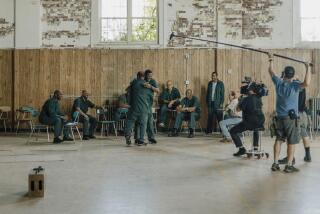Review: Life rushes in to replace war’s horrors in Actors’ Gang’s exultant ‘Johnny Got His Gun’
The stage is bare but for a single chair, yet a remarkable journey — taking in scenes as varied as a placid Colorado fishing spot, a patriotic soldier sendoff and a bomb-blasted World War I battlefield — unfurls in the Actors’ Gang’s presentation of “Johnny Got His Gun.”
A ring of light defines the borders of this experience. Beyond is blackness.
We are inside the mind of a 20-year-old soldier. War has left him horrifically injured and unable to communicate, yet his brain is quite active, its workings brought to life through pure, descriptive language; spare but evocative movement; and a riveting central performance.
The staging by Tim Robbins, the Gang’s adventuresome leader, pulls us so wholly into this world that, 80 minutes later, we are surprised to realize we’ve been sitting in a brick-walled theater in Culver City the whole time.
However, there is proof of our travels: tear-slicked faces and a feeling of elation. That’s because the soldier dwells not so much on the nightmare of his situation as on the joys stored in his memories and the exhilaration of reconnecting with the everyday world.
Some theatergoers will have read “Johnny Got His Gun” in school. The novel was published in 1939, when Trumbo was a fledgling screenwriter, a blacklist-beset career that, nevertheless, delivered two Oscar-winning scripts, the clandestinely written “Roman Holiday” and “The Brave One,” as well as such screenplays as “Spartacus” and “Exodus.”
Bradley Rand Smith adapted the novel to be performed by one person. It was first presented in 1982 in New York with Jeff Daniels.
In Robbins’ version, most of the text is still spoken by a single actor, the riveting Nathan Woodworth, but he is surrounded by eight others. They are like neurons firing in his mind, multiplying out through space. They echo the soldier’s thoughts, mirror his emotions and occasionally become the people in his memories.
Everyone is dressed in black or gray, causing their bodies to be swallowed into the semi-darkness and leaving us to focus on their marvelously expressive faces.
The title echoes a recruiting slogan that George M. Cohan wove into his World War I ditty “Over There.” The song is heard faintly at the beginning as the soldier recalls his hometown’s big sendoff for enlistees.
Imagining that he has returned from battle, he calls out to his sweetheart: “I’m here! … Just like you remember me.”
Moments later, his smiling reverie turns to wide-eyed panic. “My God,” he realizes, “I’m hurt bad.”
By the time he’s done taking stock, he realizes that he is not home, but in a hospital somewhere, and that he’s been reduced to limbless, faceless flesh. He no longer has a mouth or eyes, nor can he hear.
Yet what we see is a whole, handsome young man, which is fitting because the most vital part of him remains uninjured, and it keeps him connected to the world.
To stay focused, the soldier works his way through multiplication tables or names the planets. Memories are his greatest consolation: simple pleasures like listening to his mother hum to herself during chores, fishing with his father, wrapping his arms around his girlfriend. He becomes particularly energized as he devises ways to tell time, then to communicate with the outside world. Woodworth and the actor-neurons work with such precision and surging excitement here that you want to stand and cheer them on.
Bosco Flanagan’s lighting design puts Woodworth in a spot of light, the others in shadow unless they are especially active. This keeps Woodworth constantly in focus, but then, who could look anywhere else while he’s progressing through every emotion known to man? It’s a thrilling display.
With the soldier as an indelible symbol of the true cost of war, “Johnny” is in many ways an argument against armed conflict. Yet still more it’s a catalog of life, sending us off to experience more of it — and reminding us to savor every moment.
♦ ♦ ♦ ♦ ♦ ♦ ♦ ♦ ♦ ♦ ♦
‘Johnny Got His Gun’
Where: Actors’ Gang Theatre, 9070 Venice Blvd., Culver City
When: 8 p.m. Thursdays-Saturdays, 2 p.m. Sundays (no performances Oct. 20-21); ends Nov. 10
Tickets: $25-$35; Thursdays pay what you can
Info: (310) 838-4264, theactorsgang.com
Twitter: @darylhmiller
More to Read
The biggest entertainment stories
Get our big stories about Hollywood, film, television, music, arts, culture and more right in your inbox as soon as they publish.
You may occasionally receive promotional content from the Los Angeles Times.











